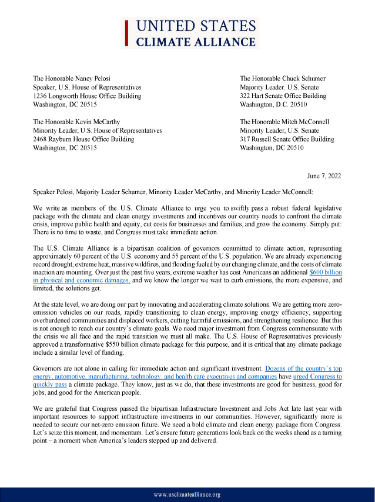Home / U.S. Climate Alliance Calls on Congress to Pass Bold Climate and Clean Energy Package

Tags
- Letter
U.S. Climate Alliance Calls on Congress to Pass Bold Climate and Clean Energy Package
June 7, 2022
In a letter to Congressional leaders, 22 U.S. Climate Alliance governors called for swift passage of a robust federal legislative package with the climate and clean energy investments and incentives our country needs to confront the climate crisis, improve public health and equity, cut costs for businesses and families, and grow the economy.
“We need a bold climate and clean energy package from Congress,” wrote the governors in the letter. “There is no time to waste, and Congress must take immediate action.”
Signatories of the letter included the governors of: California, Colorado, Connecticut, Delaware, Hawaii, Illinois, Louisiana, Maine, Michigan, Minnesota, Nevada, New Jersey, New Mexico, New York, North Carolina, Oregon, Pennsylvania, Puerto Rico, Rhode Island, Vermont, Washington, and Wisconsin.
About the Alliance
Launched in 2017 by the governors of Washington, New York, and California to help fill the void left by the U.S. federal government’s withdrawal from the Paris Agreement, the Alliance has grown to include 24 governors from across the U.S. representing approximately 60 percent of the U.S. economy and 55 percent of the U.S. population. Governors in the Alliance have pledged to collectively reduce net greenhouse gas emissions by at least 26-28 percent by 2025, 50-52 percent by 2030, and 61-66 percent by 2035, all below 2005 levels, and collectively achieve overall net-zero greenhouse gas emissions as soon as practicable, and no later than 2050.
The Alliance’s states and territories continue to advance innovative and impactful climate solutions to grow the economy, create jobs, and protect public health, and have a long record of action and results. In fact, the latest data shows that as of 2023, the Alliance has reduced its collective net greenhouse gas emissions by 24 percent below 2005 levels, while increasing collective GDP by 34 percent, and is on track to meet its near-term climate goal of reducing collective greenhouse gas emissions 26 percent below 2005 levels by 2025.
###